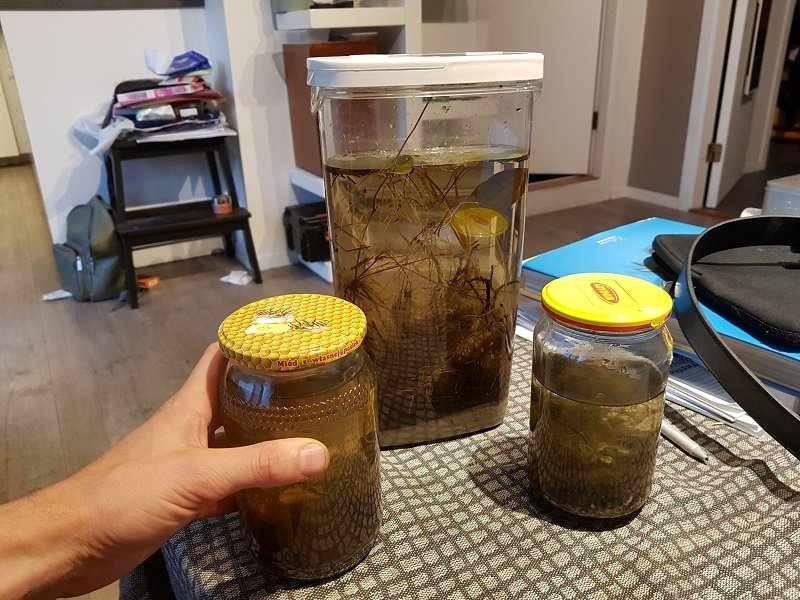Page 1 of 1
Pond water conservation in a 25 liter bucket
Posted: Sat Jul 24, 2021 6:41 pm
by Rat
Many know that there is a great diversity of microorganisms in pond water.
Many times, you do not have time to collect a pond water sample and observe it under a microscope within a few hours. Possibly you can do it after two or three days.
Having said that,
Is there a way to preserve pond water in a 25 liter bucket without deteriorating it?
He had thought of a pump that breathes air (oxygen) like those used in fish tanks so that the fish do not die.
Would it help the water to last longer without being clouded by algae and bacteria?
This causes the death of some species of microorganisms.
Re: Pond water conservation in a 25 liter bucket
Posted: Sat Jul 24, 2021 6:54 pm
by Dubious
25 liters is overkill. I collect water in small jars, usually trying to scrape up some vegetation with the sample, and while over time there is some change in the proportion of various organisms, the specimens easily last for many days. If you want to maintain a more permanent "menagerie," you should consider a small fish tank (without the fish but with a few plants) with a bubbler to aerate the water.
Re: Pond water conservation in a 25 liter bucket
Posted: Sat Jul 24, 2021 6:56 pm
by BramHuntingNematodes
I get the impression that pond water organisms are continuously in flux as far as the most active species go depending on the environment. My son and were looking at some water from a bird bath as part of a school assignment and while rotifers were seen immediately after sampling, a few hours later amoebae were seen swarming the water.
I have had water sit in a petri dish for three or four weeks that still had ciliates moving around in it. After it dried completely I put new water in it and several hours later things once again were moving around in it. I don't know exactly what effect aeration might have on your sample, but you might try it and record your observations here.
Re: Pond water conservation in a 25 liter bucket
Posted: Wed Jul 28, 2021 5:45 pm
by Rat
I think I have not been fully understood, or rather nothing.
The idea is to make an ecosphere. It would be an ideal way of not having to go looking for ponds around the world, since you would have it comfortably at home (desk, room, dining room ...)
Example of how to build it:
https://www.youtube.com/watch?v=W6Ovg6oHJV4&t=11s
All the best.
Re: Pond water conservation in a 25 liter bucket
Posted: Wed Jul 28, 2021 5:58 pm
by patta
Yes, ecosphere!
It is actually easier that it seems, just take some dirt and plants together with the water sample.
I'd recommend you to start smaller than 25 liters; in my case, 1 kg honey glass jars work fine. The larger in the photo, is an Ikea 5$ food container, it is optically much flatter so easier to look in it; and looks quite ok in the living room, almost a real aquarium. Not all critters will survive in them - but, many other thrive almost indefinitely (months, maybe years). Sealed in one liter of water...
25 liters bucket, should be capable of keeping also a population of "large" predators. But a bucket, you can't look in it. And will need some light to get in for photosynthesis. If you can get a real, second hand aquarium, that will be nicer. No need for filters or aeration for a natural, self driving ecosphere. I'll get one at some point.
Another youtube channel on ecospheres (aka jars full of pond water)
https://www.youtube.com/c/Jartopia/videos
.

- Vases.jpg (144.03 KiB) Viewed 3527 times
Re: Pond water conservation in a 25 liter bucket
Posted: Wed Jul 28, 2021 9:07 pm
by patta
Ah, no pumping air in it, oxigen and food are provided solely by the algae growing in it.
Clouding by algae and bacteria, that's ok, will reach some equilibrium just like in the pond. They're food for our beloved ciliates...
it is not an aquarium, no manteinance; it is a small wild pond.
Re: Pond water conservation in a 25 liter bucket
Posted: Wed Sep 22, 2021 11:08 am
by smollerthings
Ecosphere vs small aquarium with bubbler. What are the pros and cons of each? Which one yields a richer eco system?